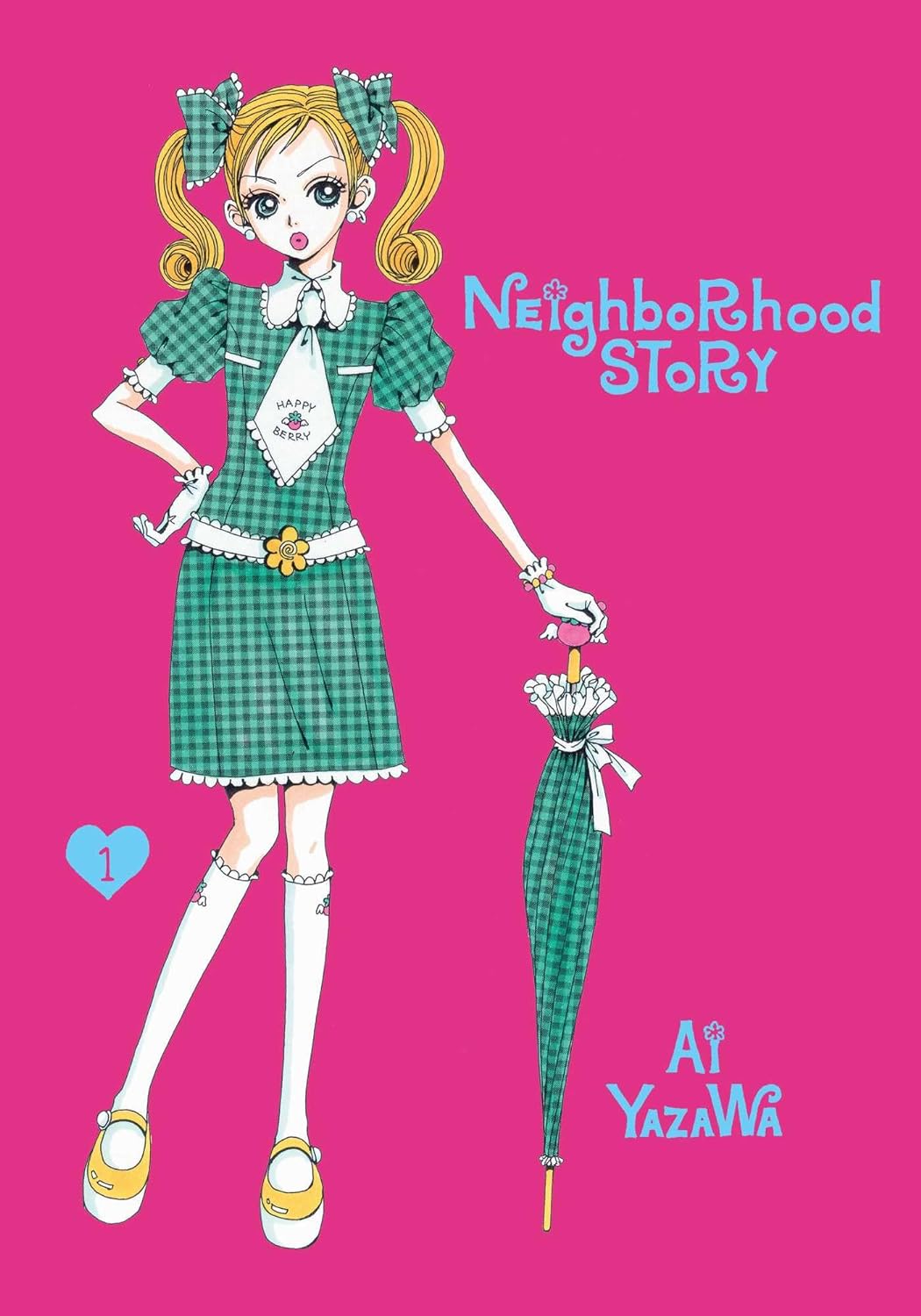MANGA REVIEW | "Neighborhood Story" - Volume One
How odd that it’s just now that Ai Yazawa’s Neighborhood Story is being released in the West. After all, TokyoPop released Paradise Kiss back in its heyday, and that was something of a pseudo-sequel to it. But I shouldn’t be complaining; I should instead be celebrating. That's because Neighborhood Story is the series where Yazawa cemented her style, one that combines beauty and silliness, sometimes on the same page! It’s also quite the time capsule, a tale that really brings the world of 90s trends in Japan to curious eyes.
Neighborhood Story places its focus on two childhood friends: Mikako Koda (who also shows up in Paradise Kiss) and Tsutomu Yamaguchi. They’ve barely ever been apart, and are the best of friends. But both have a crush on one another, and neither want to say anything about it. As such, they keep their mouths shut and take on their daily lives with their close friends. However, as time ticks down, a love confession seems to get closer by the moment.
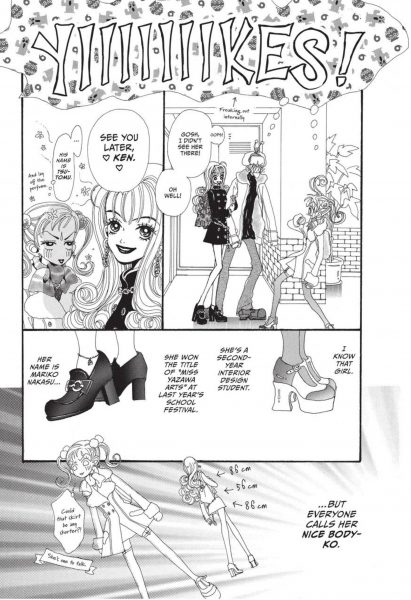
At the Yazawa Art Academy, Mikako spends her time learning how to make clothes. Her dream is to become a fashion designer, and has already picked out the name “Happy Berry” as her brand. But her clothing quality depends on her mood, with her often mucking up her handiwork when she’s thinking too much about Tsutomu. Her bestie Risa keeps an eye on her to make sure she’s cool, but most of her lovesick issues tend to stay deep within her.
Things get complicated when Tsutomu begins dating Mariko (nicknamed “Body Ko” due to her sultry fashion style), causing Mikako to get into a tizzy. But the romance is short-lived, due to Tsutomu’s true feeling for Mikako and Mariko’s childhood friend crush. As such, there’s a lot of back-and-forth friendliness and angst between these two childhood friends. This leads to the question on everyone’s minds: “When will these two grow a pair and actually say what’s in their hearts?!”
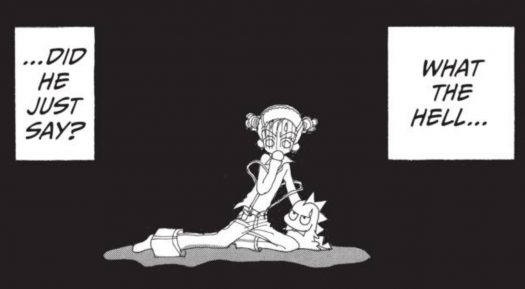
Girl, you heard me!
Many of the conflicts in Neighborhood Story could easily be fixed with better word choices. (But if Yazawa did that, the manga would probably run for less than three chapters.) Thankfully, much of the narrative is both funny and entertaining, as the childhood friends often bicker at one another like an old married couple. It also helps that the series is delightfully artistic with its visuals.
One moment, you’ll be in awe of the beauty displayed in how Mikako’s eyes look. But in the next, you’ll be giggling at how Tsutomu looks like a monkey. The series often goes back-and-forth between looking truly gorgeous and looking like a gag manga, and it does so kind of flawlessly. That’s the knack of Ai Yazawa, who can bring all things pretty and goofy into one piece of work.
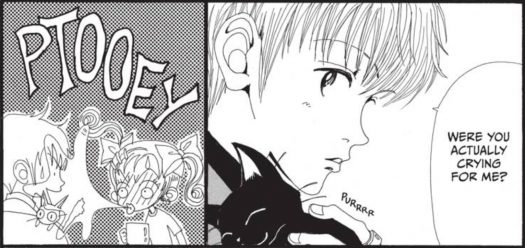
It’s also interesting seeing how much Neighborhood Story captures the 90s era in Japan. Fashion was all over the place, and I don’t think any of these characters wear the same thing twice throughout this 300-paged first volume. (Then again, perhaps you could say the same thing about American fashion, which had just as big of an identity crisis.) From cut-off jeans and frilly Lolita dresses to punk rock getups, every outfit showcased in these chapters looks like it’s ready to conquer the catwalk at a retro Fashion Week.
But where the story shines most is in its heart. While it takes awhile for our two lovebirds to actually chirp, the other characters have their moments of heartache to deal with. Perhaps the most complex of these characters is Mariko, who decides to give it her all and confess to her friend. Things don’t go the way she planned, resulting in her having a bad bout of heartache and an identity crisis. She tries to soldier on, but when a friend can see through her facade, Mariko breaks down and pours her heart out in a way that’s relatable and soul-crushing.
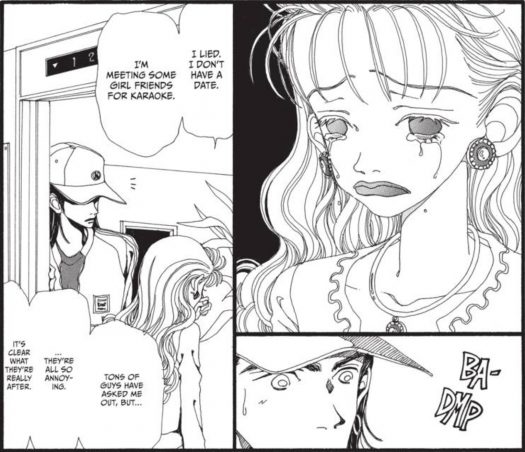
It may have taken us nearly three decades, but Neighborhood Story is finally here for the English-speaking world to appreciate. It’s not a masterpiece like Paradise Kiss, but without it, the pseudo-sequel wouldn’t exist in the first place. Neighborhood Story is cute, vivid, funny, and relatable, even if it takes place during the time No Doubt was still a ska band. At any rate, fans of fashion and unique visuals should not miss out on the rise of Happy Berry and the growing hearts of both Mikako and Tsutomu.
FINAL GRADE:
Promotional consideration provided by Chantelle Sturt of VIZ Media.


